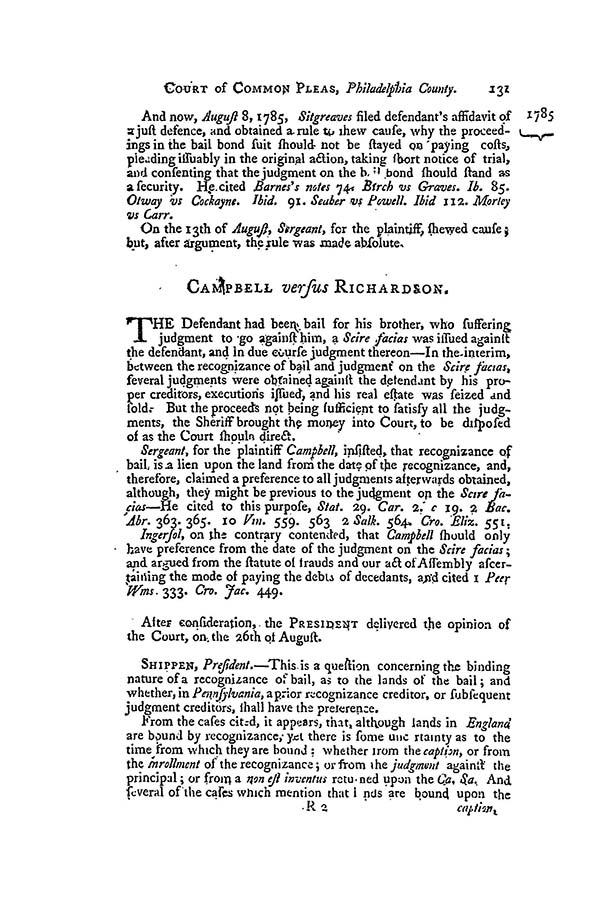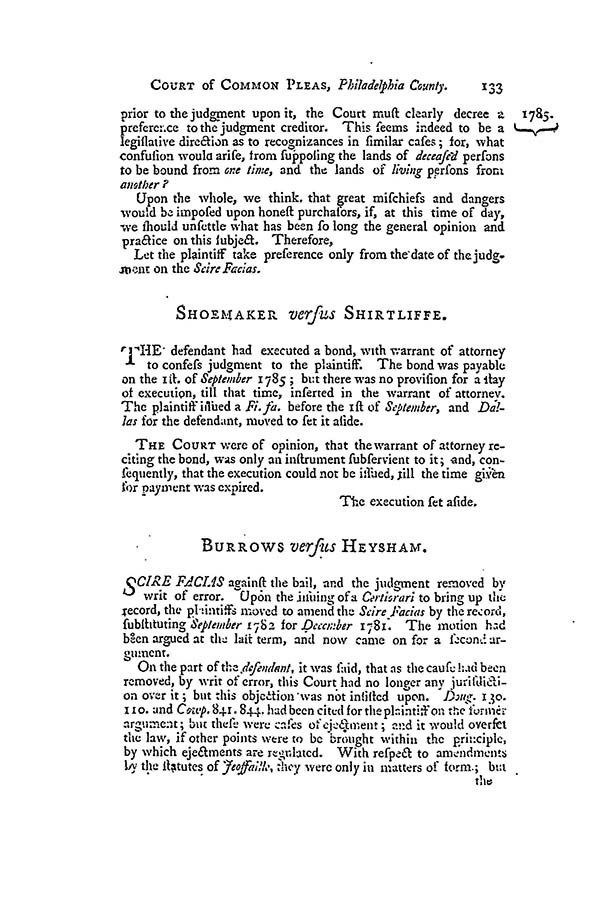Campbell v. Richardson, 1 Dall. 131 (C. P. Phila. Cty. 1785)
Campbell versus Richardson.
The Defendant had been bail for his brother, who suffering judgment to go against him, a Scire facias was issued against the defendant, and in due course judgment thereon—In the interim, between the recognizance of bail and judgment on the Scire facias, several judgments were obtained against the defendant by his proper creditors, executions issued, and his real estate was seized and sold. But the proceeds not being sufficient to satisfy all the judgments, the Sheriff brought the money into Court, to be disposed of as the Court should direct.
Sergeant, for the plaintiff Campbell, insisted, that recognizance of bail is a lien upon the land from the date of the recognizance, and, therefore, claimed a preference to all judgments afterwards obtained, although, they might be previous to the judgment on the Scire facias—He cited to this purpose, Stat. 29. Car. 2. c 19.2 Bac. Abr. 363. 365. 10 Vin. 559. 563 2 Salk. 564. Cro. Eliz. 551.
Ingersol, on the contrary contended, that Campbell should only have preference from the date of the judgment on the Scire facias; and argued from the statute of frauds and our act of Assembly ascertaining the mode of paying the debts of decendants, and cited I Peer Wms. 333. Cro. Fac. 449.
After consideration, the President delivered the opinion of the Court, on the 26th of August.
Shippen, President.—This is a question concerning the binding nature of a recognizance of bail, as to the lands of the bail; and whether, in Pennsylvania, a prior recognizance creditor, or subsequent judgment creditors, shall have the preference.
From the cases cited, it appears, that, although lands in England are bound by recognizance, yet there is some uncertainty as to the time from which they are bound: whether from the caption, or from tje inrollment of the recognizance; or from the judgment against the principal; or from a non est inventus returned upon the Ca, Sa. And several of the cases which mention that lands are bound upon theI do not find that there have been any legal decisions upon this point in Pensylvania; but a general opinion has taken place, which has been carried into universal practice, that recognizances do not here bind lands, until they are proceeded upon to judgment against the bail. Hence it is, that, whenever a purchase, or mortgage, is made, the examination at the offices, and the certificates which are given by the prothonotaries, are only of the judgments in force against the seller, or mortgagor, and not concerning recognizances. The practice has, indeed, been so general, that all the conveyancers and lawyers, for a long course of years, have, on such occasions, confined their enquiries to that circumstance alone; and many titles must, therefore, depend upon it, which would be shaken if a contrary construction should now be adopted.
Whether this opinion took its rise from the different situation in which the lands of this country are from those of England, and from their being liable to be sold for debts; or from the silence of the Legislature upon the subject; or from what other cause, we can but conjecture. It is remarkable, however, that when our act for the prevention of frauds was made, in the year 1772, although the Legislature copied the clause in the English statute relating to judgments, and was minutely exact as to the time from which they should bind lands, yet they totally omitted the clause relating to recognizances. This silence, it is true, is no abrogation of a law; but it looks as if the Assembly had taken up the popular idea, that recognizances did not bind till judgments were obtained upon them, and, therefore, they thought that no particular provision was in that respect necessary. Upon what principle, indeed, could they else have been so careful of innocent purchasers in the one case, and not in the other?
We may also properly take into view, that, long before the passing of this act for the prevention of frauds, the relative dignity of judgment debts, and of those upon recognizance, had been settled by a law, directing the order of paying the debts of persons deceased. That is—1st. Physic and funeral expences.—2nd. Debts and duties to the Queen.—3rd. Debts due to the proprietor and governor.—4th. Judgments.—5th. Debts due by recognizances.—6th. Rents &c. If, however, it should be said, that this is only a direction in what order debts shall be paid, without any respect to the binding nature of judgments and recognizances, it may be answered, that, from the situation of lands in this country, that consideration must necessarily be included. Here, as I have already observed, lands are chattels for the payment of debts; they are chattels too in the hands of executors; and all writs of Fi. fa. direct the levy accordingly to be made, of the goods and chattels, lands and tenements of the deceased, in the hands of the executor. If, then, in such a case, two writs are executed upon lands, founded, one upon a prior recognizance, and the other on a judgment subsequent to the recognizance, but
Upon the whole, we think, that great mischiefs and dangers would be imposed upon honest purchasors, if, at this time day, we should unsettle what has been so long the general opinion and practice on this subject. Therefore,
Let the plaintiff take preference only from the date of the judgment on the Scire Facias.
Citation: Campbell v. Richardson, 1 Dall. 131, 1 U.S. 131 (C. P. Phila. Cty. 1785)



Last modified: December 5, 2014